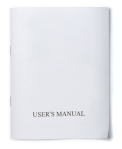Chapter 12
Is Stan actually reading Chris’s mind?
No. Doug would never give any mortal, especially a malevolent one, the ability to invade another’s privacy without permission. However, all body language is fair game, and Stan has had a lot of experience in learning to interpret it. His acute perception, along with his thorough knowledge of human behavior, allows him to deduce thoughts well enough to give the impression that he can read minds. He purposely milks this impression for all it’s worth, knowing that it spooks people, just as it does Chris.
Stan seems to have a good knowledge of The Runner’s Manual. Why?
Stan’s copy of The Runner’s Manual is actually very well worn; in fact, he knows its contents better than many runners. One of his favorite uses of it is to misquote or misconstrue it in order to confuse and discourage runners, as he does with Chris at the gym. But he does have other uses for it, too. In the third book, we learn that he analyzes The Manual for information about Doug’s plans to determine how best to attack him during the Final Battle. Similarly, he searches it for key foundational principles (e.g. creation or the Rest Day) and constructs plans, sometimes spanning centuries, to undermine the credibility or acceptability of that principle to humans, thereby removing them that much farther from Doug.
What you may not expect is that Stan also uses The Runner’s Manual as a sort of owner’s manual when it comes to health. This is actually one of the few places where Stan’s example would be valuable to runners. As a dedicated athlete, he’s extremely fervent, almost fanatical, about following its guidelines in this area. For instance, he strictly follows the dietary guidelines found in Leviticus when he eats meat, although he does so rarely (he usually sticks to the original diet as given to Adam). Camille is not as strict as Stan is on the health front, but she, too, generally follows The Manual’s health guidelines.
What causes static on the transmitter?
In an earlier version of The Race, Chris asked this same question, and Josh answered it in Chapter 36. (I cut the section because the chapter was dragging a bit, and Josh had already answered a similar question about the physical properties of doubt in Chapter 5.) Here is that explanation, which occurs when Josh relates the story of Juan Misi’s fight with Stan at the same gym.
“Juan finally called Dad,” Josh said. “But he had trouble with reception over the transmitter, as everyone does there—”
“Yeah, why is the reception so bad in that building?” Chris asked.
“It’s not the building, but the reason people are in the building. As the Manual says, ‘anyone who comes to Doug must believe that he exists and that he rewards those who earnestly seek him.’ Unbelief interferes with your ability to hear Dad’s messages over the transmitter.”
“Like the way doubt interfered with my ability to hear your voice in Death Valley?”
“Exactly. People take that detour to Stan’s gym because they’re looking for another way to win the prize. They either don’t believe Dad’s assurance that following the racecourse is the best way, or they’re looking for an easier way than ‘earnestly’ seeking it.”
“I was just hoping to help Kenny.”
“Is that all?” Josh’s penetrating gaze seemed to expose all of Chris’s deepest thoughts and motivations. “You signed up for Stan’s so-called ‘Quick Boost’ program to help Kenny? You stayed overnight to help Kenny?”
Chris’s gaze fell to his hands. He couldn’t hardly claim that, could he? After all, Kenny hadn’t even stayed overnight!
“No,” he admitted. “I see what you mean. I was looking for an easier way—I wanted to increase my endurance so I could complete the course faster.” Remembering the discussion, he added thoughtfully, “And Stan made it sound like that was wise—enlightened even.”
Josh nodded. “He gets a big kick out of making wisdom appear foolish, and making foolishness appear wise.”

